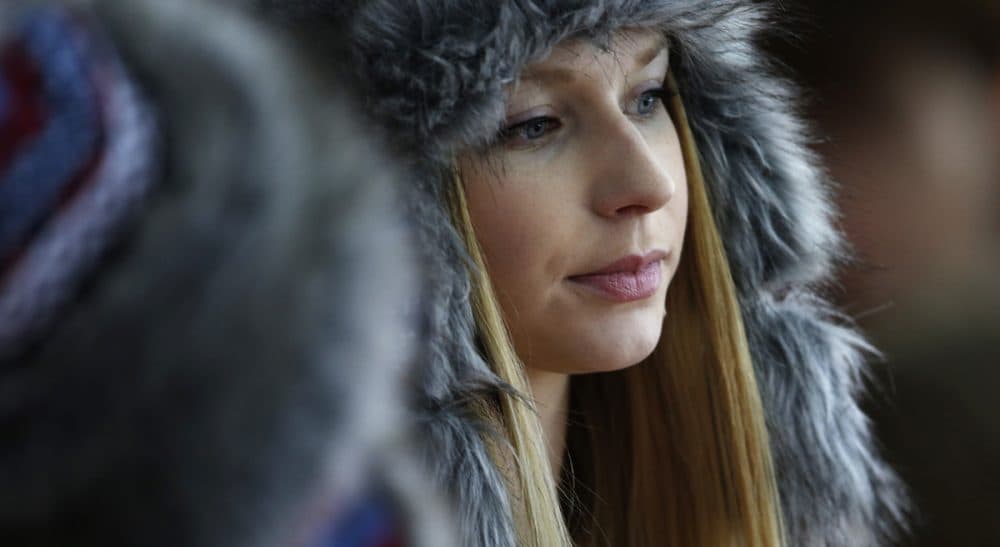Advertisement
Why The Olympics Left Me Cold

Years ago, on my first date with my eventual husband-to-be, we went to hear a mountaineer describe his incredible feats climbing rock cliffs thousands of feet high in Greenland.
As we walked out, I said what I really thought: “The whole thing would have been so much more compelling if there had been some children on top of the 5,000-foot granite wall who needed to be saved, don’t you think?”
Yes, I confess it. Though it may get me kicked out of Boston, I’m just missing the gene that allows me to derive meaning from sports, whether it’s rock-climbing, Olympic figure skating, or even — dare I say it? — Red Sox baseball.
I do appreciate the beauty and courage and endurance of top-level athletes. But I can never see the games and contests in which they compete as anything more than elaborate and empty artificial constructs created for an entertainment industry that brings in billions from people who somehow do derive some meaning from it.
So you can imagine my reaction as I watch our children consuming the hoopla of the Sochi Olympics. I see them being sold a story that goes like this: These athletes are American (or Dutch or Japanese) heroes. They had a dream. They overcame great adversity to realize that dream. And now they may reap the ultimate reward — public glory!
Here’s what I want to tell my children. First, all dreams are not created equal. What if your dream were to build the biggest pile of buttons in the world? Would that be the same as the dream of curing cancer or feeding hungry Africans or writing the Great American Novel?
Second of all, dreams are great, but what matters far more is finding something you love that can last. I had a wild dream when I was a kid in the Cold War era, that I wanted to be a Moscow correspondent someday. And I had the incredible luck of realizing that dream, but I didn’t want to live in Russia forever, so that dream had to end. And what has really sustained me was that the skill I’d learned in pursuit of that dream — reporting — was something I loved and could practice forever.
I can never see [sports] as anything more than elaborate and empty artificial constructs...
I hope you love playing sports all your lives. They’re great for you and a source of huge fun. But we must never forget — especially during your school years when sports can be so incomprehensibly overblown in importance — that sports are meaningful only in what they can teach you: how to be a team member. How to lose. How to win. How to fall down and get back up.
They do not ultimately, in any other way, matter. If your home town or home country team wins, it gives you a nice little lift but it doesn’t change your town or country in any significant way.
As for the reward of public glory, well, I’m far from the first to say that the acclaim and money accorded to athletes is one of our market-driven society’s most disturbing distortions.
What really matters, of course, is virtue, in all its many forms. If I ran a TV network, I’d offer some very different public competitions:
The Caregiving Olympics
Toughing through a Triathlon or Decathlon is nothing compared to the level of endurance displayed by a middle-aged woman who cares for high-needs children and a parent with dementia, all of whom need hourly care day after day, month after month, year after year, all while holding down a full-time job. When will there be public prizes for these private feats, for all those endurance athletes who care for the weak, the disabled, abandoned animals, solo elders, who are daily life’s true heroes?
The Intellectual Olympics
sports are meaningful only in what they can teach you: how to be a team member. How to lose. How to win. How to fall down and get back up.
Sure, physical power was paramount back in the caveman days. But you don’t need me to tell you that to survive in the knowledge economy that is our current-day reality, what you need is brains. So where are all the broadcasts of geography bees and math Olympiads? Believe me, the suspense of watching a seventh-grader attempt to spell onomatopoeia can rival any ski jump.
Back to that first date. My husband and I will forever differ on how we see sports in theory — he’s a gifted athlete and manages to find not just meaning but intellectual interest in contests of skill.
But in practice, what I see is that he’s teaching our children to skate and to ski, getting them past the falls, helping them learn the persistence of drilling tricky moves until they become easy.
The Olympic speedskaters may leave me cold, but when I see a parent nurturing his children, lavishing them with his attention and support, that, in my book, gets a gold.
A version of this piece was originally posted on CommonHealth.
